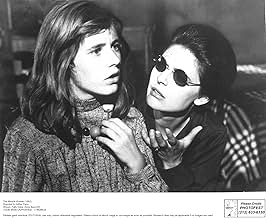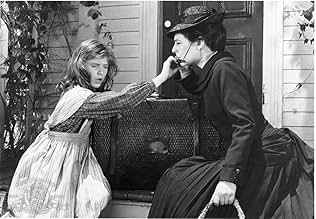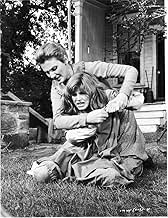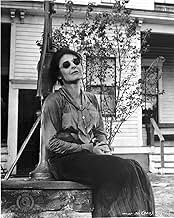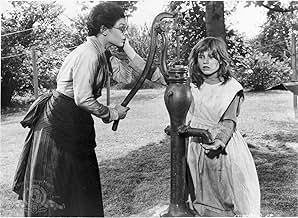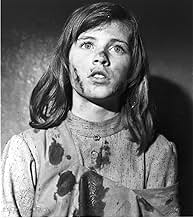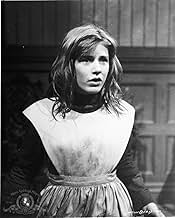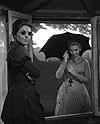The story of Anne Sullivan's struggle to teach the blind, deaf and mute child Helen Keller how to understand and communicate.The story of Anne Sullivan's struggle to teach the blind, deaf and mute child Helen Keller how to understand and communicate.The story of Anne Sullivan's struggle to teach the blind, deaf and mute child Helen Keller how to understand and communicate.
- Won 2 Oscars
- 13 wins & 13 nominations total
Maribel Ayuso
- Undetermined Role
- (uncredited)
Dale Ellen Bethea
- Martha at Age 10
- (uncredited)
John Bliss
- Admissions Officer
- (uncredited)
Grant Code
- Doctor
- (uncredited)
Michael Darden
- Percy at Age 10
- (uncredited)
Michele Farr
- Annie at Age 10
- (uncredited)
William F. Haddock
- 2nd Crone
- (uncredited)
Alan Howard
- Jimmie at Age 8
- (uncredited)
Judith Lowry
- 1st Crone
- (uncredited)
Helen Ludlam
- 3rd Crone
- (uncredited)
Beah Richards
- Viney - Keller Maid
- (uncredited)
Featured reviews
I bought this movie after having not seen it for a while, and watching it again was intensely powerful. I had never cried during the "water" scene, but I did this time. The scene in the dining room is magnificently filmed and exhausting to watch...to think Patty Duke and Anne Bancroft performed that scene every night on Broadway! Supposedly they wore multiple layers of padding. I don't know why they didn't create a new category for the Oscars that year, Best Double Performance in Leading Roles. They both richly deserved the Oscars they won, but I really couldn't choose between a leading role and a supporting role in that movie since Duke and Bancroft created such a beautiful and moving partnership. Having read a great deal about Helen Keller, including her own autobiography, I am still always amazed by her story and accomplishments. This movie is a brilliant testament to human strength.
Arthur Penn's superb, emotionally devastating screen version of William Gibson's play about the early life of Helen Keller and of how a great dedicated teacher, Annie Sullivan, dragged her kicking, if not necessarily screaming, out of her world of darkness. Penn's style is spare and unsensational, (even finding a good deal of humour in the early encounters between teacher and pupil; deaf, dumb and blind Keller may be but she is as wily as a cat and runs rings round Sullivan). The black and white images are straightforward and uncluttered and have the power of the images in silent cinema. As Sullivan and Keller, Anne Bancroft and Patty Duke are both astonishing. There is a rapport between these two actresses that seems to transcend mere 'acting' and raises the film to an altogether higher, more deeply moving plain.
Where do I begin? Shall I speak of Mrs Bancroft's performance,one of the finest you can watch on a screen?Shall I tell about Patty Duke's tour de force?Shall I praise the mind-boggling work of Arthur Penn,directing the long fight around the table?This movie is a miracle in itself.Behind her dark spectacles,the teacher hides buried terrors,that's why she's bound to understand her unusual pupil.She knows that the solution to her problems lies in herself,that the family is a prison .The parents do not see(or do not want to see) that they erect a wall between their daughter and the world outside by poisoning her with protection.That's why Annie seems brutal,hard on Helen.She could not have broken the wall if she had been a "nice" teacher.Among all Penn's great movies ,"miracle worker" is the only one that has an optimistic end.Since,other directors have tackled autism(children of a lesser God,rain man)but no one has surpassed this black and white gem.
I haven't seen acting like this in a long time! Patty Duke's portrayal of young Helen Keller shocked me with its intensity, rightness, and sensitivity. Anne Bancroft also played a tough role and did so brilliantly.
The other supporting roles were, of course, a bit stilted in the traditional Southern way, but added to the drama nonetheless. I still gave this movie a "10" despite having issues with the way director Penn handled the flashback scenes...a bit cheesy and not quite in keeping with the underlying plot in all cases. That said, the dinner scene with Patty Duke and Anne Bancroft is 100%+ riveting in a way seldom seen and the movie deserves its accolades just for that scene alone.
The other supporting roles were, of course, a bit stilted in the traditional Southern way, but added to the drama nonetheless. I still gave this movie a "10" despite having issues with the way director Penn handled the flashback scenes...a bit cheesy and not quite in keeping with the underlying plot in all cases. That said, the dinner scene with Patty Duke and Anne Bancroft is 100%+ riveting in a way seldom seen and the movie deserves its accolades just for that scene alone.
This movie made a strong impression on me when I saw it on Tv as a lad and I have revisted it a few more times but it had been a decade since i saw it last and my daughter had a done a book report on Helen Keller recently and was very moved by her story and I mentioned the Miracle Worker, so we rented it and viewed it tonight and it still packs a wallop and the performances are first rate. Patty Duke won the best supporting oscar that year and deserved it (even though she beat out Mary Badham who played Scout in To Kill A Mockingbird -- what a year for young actresses!!!)and Anne Bancroft is amazing as the tough, determined Anne Sullivan. A wonderful film.
Did you know
- TriviaMark Twain was the first person to refer to Anne Sullivan as "the miracle worker". Twain was a friend of Helen Keller.
- GoofsAnnie Sullivan has to look up the word discipline in a dictionary later in the film even though she's used it in a letter near the beginning; however, she remarks that she must know how to spell it before teaching it to Helen, and may have simply used her best guess in the letter since nothing was at stake.
- Quotes
Annie Sullivan: Pity? For this tyrant? The whole house turns on her whims! Is there anything she wants she doesn't get? I'll tell you what I pity: that the sun won't rise and set for her all her life, and every day you're telling her it will! What good will your pity do when you're under the strawberries, Captain Keller?
- ConnectionsEdited into Histoire(s) du cinéma: Le contrôle de l'univers (1999)
- SoundtracksHush, Little Baby
(uncredited)
Traditional Southern lullaby
Music adapted by Don Costa
Lyrics by Arthur Siegel
Sung by Anne Bancroft
Also played in the score
Details
Box office
- Budget
- $500,000 (estimated)
- Gross worldwide
- $4,139
- Runtime
- 1h 46m(106 min)
- Color
- Sound mix
- Aspect ratio
- 1.85 : 1
Contribute to this page
Suggest an edit or add missing content



